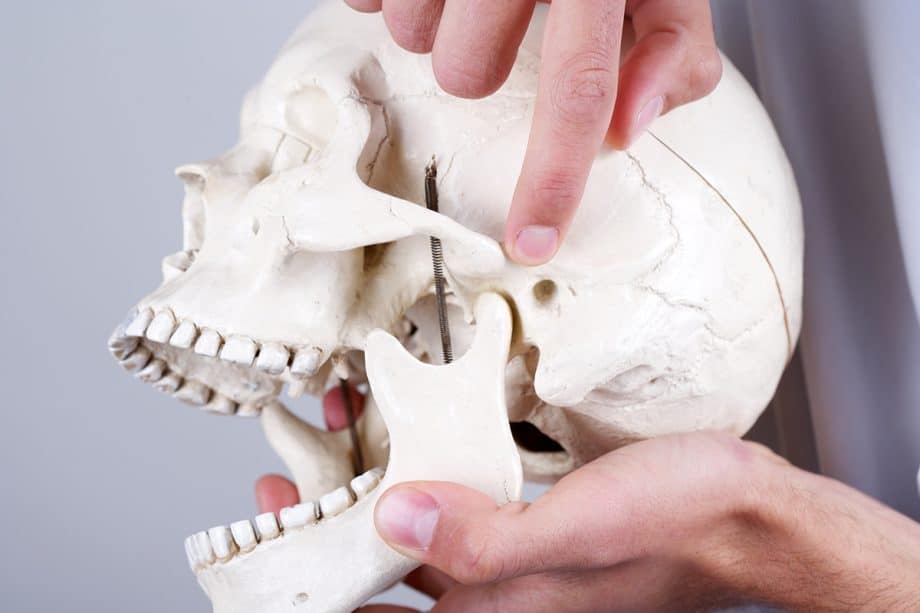TMJ pain mostly occurs in the jaw. The temporomandibular joints, TMJ for short, are the two joints on each side of the head where the lower jaw connects to the skull. TMJ disorder occurs when one or both of these joints become strained. The primary symptoms include pain and limited range of motion in the jaw.
Do you have TMJ pain? Does it keep coming back again and again? When TMJ pain is recurring, you need treatment that will provide permanent relief. Can TMJ disorder be permanently cured? Possibly, with the right treatment.
What is TMJ Disorder?
When the temporomandibular joint is injured in some way, it causes inflammation of the joint. The TMJ can become misaligned, the disc can slip out of place, and the ligaments and tendons can become strained.
Symptoms of TMJ Disorder
The following symptoms often indicate TMJ disorder:
- Pain in the TMJ. One or both of the temporomandibular joints can become painful.
- Pain in the jaw. Pain can exist in other parts of the jaw as well.
- Headaches. Headaches can be a sign of TMJ disorder, especially in the temple region of the head.
- Ear pain. The TMJ is so close to the ear canal that it can seem as if the pain is in the ear. Sometimes the inflammation and swelling of the joint can put pressure on the ear canal to cause ear pain.
- Limited motion of the jaw. You may find it difficult to open and close your mouth. Your mouth may not open as widely as it should be able to.
- Popping or clicking sound. You may hear an audible popping or clicking sound in your jaw. This is caused by the bones rubbing together and the ligaments slipping over the bones.
- Pain when chewing. Chewing puts strain on the TMJ, which can be painful if the joint is already inflamed.
- Pain in the facial muscles. The swelling and tension from the inflamed joint can cause the facial muscles to feel tight and painful.
What Causes TMJ Disorder?
There are a few possible causes of TMJ Disorder:
- Teeth grinding. Chronic teeth grinding can put strain on the TMJ.
- Injury. A blow to the jaw can knock the TMJ out of alignment.
- Arthritis. Arthritis is a condition that affects the joints, which can also affect the TMJ.
- Excessive chewing. Chewing constantly or chewing something hard can put strain on the TMJ.
How is TMJ Disorder Treated?
There are many ways to treat TMJ disorder. Start by applying ice to both joints or to the one that hurts if the pain is only on one side. Rest your jaw as much as possible by eating soft foods and avoiding talking or moving your jaw. Take anti-inflammatory pain medications to relieve your pain and inflammation.
If your TMJ pain persists after the above remedies, you may need professional treatment. Professional treatment may include a bite splint to keep your jaw in proper alignment and relieve the strain on the joint. Steroid or botox injections are sometimes effective at relieving swelling and inflammation.
When other treatments are ineffective, surgery may be the only other option. In some cases the joint may need to be restructured. In other cases the TMJ may need to be replaced with a prosthetic joint. Surgery provides a permanent solution to your TMJ pain because the source of the pain is completely eliminated by repairing or replacing the joint.
TMJ Pain Relief from UWS Oral & Maxillofacial Surgery
If you want permanent relief from the TMJ pain that has been plaguing you, Upper West Side Oral & Maxillofacial Surgery can provide the necessary treatment. Mild cases of TMJ disorder may be relieved with home remedies and anti-inflammatory medication, but severe cases may need surgery. Chronic TMJ pain can be debilitating, preventing you from getting proper nutrition. Don’t continue to suffer unnecessarily when a permanent solution is available.
Call 212-466-6984 or contact us today to learn more and schedule an appointment.


